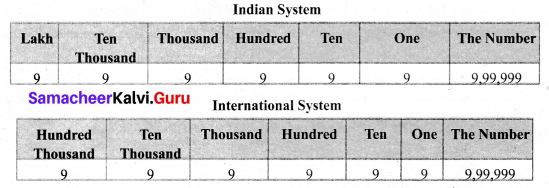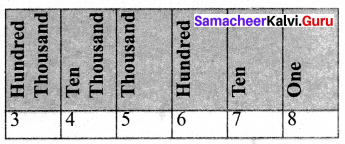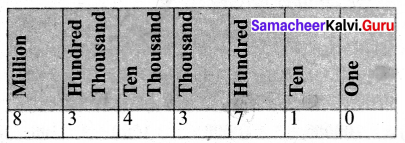You can Download Samacheer Kalvi 6th Maths Book Solutions Guide Pdf, Tamilnadu State Board help you to revise the complete Syllabus and score more marks in your examinations.
Tamilnadu Samacheer Kalvi 6th Maths Solutions Term 1 Chapter 1 Numbers Ex 1.1
![]()
Question 1.
Fill in the blanks.
- The smallest 7 digit number is _______
- The largest 8 digit number is _______
- The place value of 5 in 7005380 is ________
- The expanded form of the number 76,70,905 is _______
Solution:
- 10,00,000
- 9,99,99,999
- 5 × 1000 = 5000
- 7 × 10,00,000 + 6 × 1,00,000 + 7 × 10,000 + 0 + 9 × 100 + 0 + 5 × 1
(or)
70,00,000 + 6,00,000 + 70,000 + 900 + 5
Question 2.
Say True or False.
- In the Indian System of Numeration, the number 67999037 is written as 67999037
- The successor of a one-digit number is always a one-digit number.
- The predecessor of a 3-digit number is always a 3 or 4-digit number.
- 88888 = 8 × 10000 + 8 × 100 + 8 × 10 + 8 × 1
Solution:
- True
- False
- False
- False
![]()
Question 3.
Complete the given order.
Ten crore, crore, ten lakh, ____, ____, _____ , _____, _____.
Solution:
Ten crores, Crore, Ten lakh, Lakh, Ten Thousand, Thousand, Hundred, Ten, One
Question 4.
How many ten thousands are there in the smallest 6 digit number?
Solution:
Smallest six-digit number is 1,00,000
1 lakh = Ten Thousand
Another Method:
Lakh is only one place to the left of Ten thousand
1 lakh is 10 times ten thousand

1 lakh = Ten-Ten Thousand
Question 5.
Using the digits 5, 2, 0, 7, 3 forms the largest 5 digit number and the smallest 5 digit number.
Solution:
Given digits = 5, 2, 0, 7, 3
Largest 5 digit number – 75320
Smallest 5 digit number – 20357
Question 6.
Observe the commas and write down the place value of 7.
- 56,74,56,345
- 567,456,345
Solution:
- 56,74,56,345
Place value of 7 is 7 × 10,00,000 = 70,00,000 = Seventy Lakhs. - 567,456,345
Place value of 7 is 7 × 1,000,000 = 7,000,000 = Seven Million.
Question 7.
Write the following numbers in the International system by using commas.
(i) 347056
(ii) 7345671
(iii) 634567105
(iv) 1234567890
Solution:

![]()
Question 8.
Write the largest six-digit number and put commas in the Indian and the International Systems.
Solution:
The largest six-digit number is 999999

Question 9.
Write the number names of the following numerals in the Indian System.
(i) 75,32,105
(ii) 9,75,63,453
Solution:
(i) 75,32,105

Seventy-Five Lakhs Thirty-Two Thousand One Hundred and Five
(ii) 9,75,63,453

Nine crores Seventy Five Lakhs Sixty Three Thousand Four Hundred and Fifty-Three.
Question 10.
Write the number names in words using the International System
(i) 345,678
(ii) 8,343,710
(iii) 103,456,789
Solution:
(i) 345,678

Three Hundred and Forty-Five Thousand Six Hundred and Seventy-Eight
(ii) 8,343,710

Eight Million Three Hundred and Forty-Three Thousand Seven Hundred and Ten.
(iii) 103,456,789

One Hundred Three Million Four Hundred Fifty-Six Thousand Seven Hundred and Eighty’ Nine.
![]()
Question 11.
Write the number name in numerals.
- Two crores thirty lakhs fifty-one thousand nine hundred eighty.
- Sixty-six million three hundred forty-five thousand twenty-seven.
- Seven hundred eighty-nine million, two hundred thirteen thousand four hundred fifty six.
Solution:
- 2,30,51,980
- 66,345,027
- 789,213,456
Question 12.
Tamil Nadu has about twenty-six thousand three hundred forty-five square kilometre of Forest land. Write the number mentioned in the statement in the Indian System.
Solution:
26,345 sq km.
Question 13.
The number of employees in the Indian Railways is about 10 lakhs. Write this in the International System of numeration.
Solution:
1.000,000 (one million)
Objective Type Questions
Question 14.
1 billion is equal to
(a) 100 crore
(b) 100 million
(c) 100 lakh
(d) 10000 lakh
Solution:
(a) 100 crore
Question 15.
The successor of 10 million is
(a) 1000001
(b) 10000001
(c) 9999999
(d) 100001
Solution:
(b) 10000001
Question 16.
The difference between successor and predecessor of 99999 is
(a) 90000
(b) 1
(c) 2
(d) 99001
Solution:
(c) 2
![]()
Question 17.
The expanded form of the number 6,70,905 is
(a) 6 × 10000 + 7 × 1000 + 9 × 100 + 5 × 1
(b) 6 × 10000 + 7 × 1000 + 0 × 100 + 9 × 100 + 0 × 10 + 5 × 1
(c) 6 × 1000000 + 7 × 10000 + 0 × 1000 + 9 × 100 + 0 × 10 + 5 × 1
(d) 6 × 100000 + 7 × 10000 + 0 × 1000 + 9 × 100 + 0 × 10 + 5 × 1
Solution:
(d) 6 × 100000 + 7 × 10000 + 0 × 1000 + 9 × 100 + 0 × 10 + 5 × 1